With le Grande Boucle set to depart on Saturday June 26th from Brittany – which shares Celtic culture with Scotland – we thought we should have a look at the Scottish riders who have participated in the biggest race on the planet, over the years.
* * *
1955: Ian Steel
It was 1952 when Ian Steel pulled of a win that very few Westerners have emulated – he won the Peace Race against stiff East European opposition on the coal dust coated cobbles between Warsaw, Berlin and Prague.
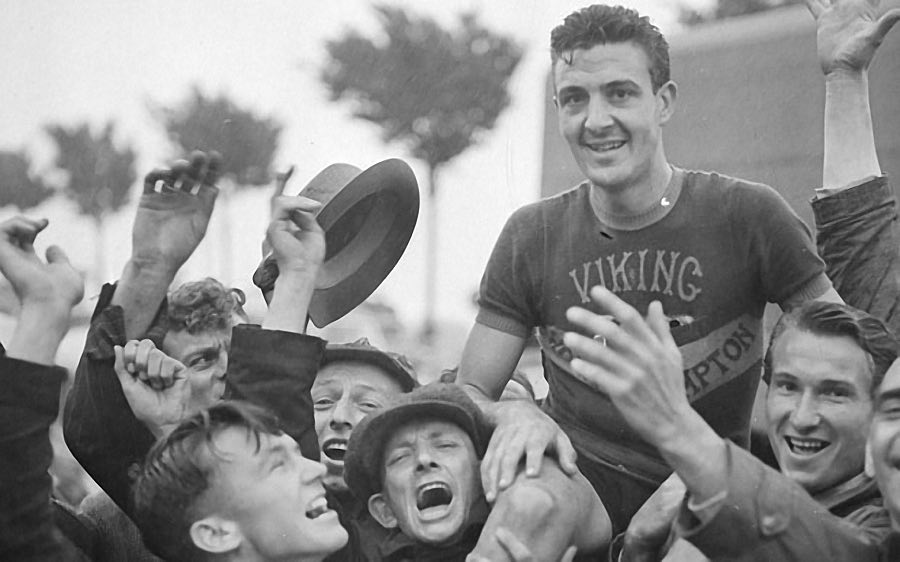
In 1951 he’d had a stellar season which included winning the Tour of Britain, whilst in 1952, the year of his Peace Race win he took the BLRC National Championship beating top English riders like Bob Maitland and ‘Tiny’ Thomas.
He tackled le Tour in 1955; he rode for the Viking team in the UK but most of his Tour team mates were from the rival British Hercules team.
The Tour team was managed by Syd Cozens, a man of whom it was said; ‘he could fall out with anybody.’
Steel rode was riding well but on Stage Eight Cozens ordered him to go back for team mates, telling Steel that if he didn’t comply then he’d send him home.
Steel’s morale was shredded and he abandoned.
I had the honour of interviewing Ian Steel back in 2011, a real privilege, he died in 2015 aged 86.
* * *
1960: John Kennedy
Kennedy was a pioneer; he turned pro in 1957, after several successful seasons as an amateur in Belgium.
It was just as hard to sign a pro contract then as it is now; there were hundreds of young Belgians keen to stave-off the inevitability of the coal mines or steel works as long as they could.

Kennedy rode as a professional for six seasons; with Bertin-d’Alessandro, Bertin-Milremo, Flandria-Wiels, Wiels-Flandria and Bertin-Porter 39.
A British rider was still very much a rarity in the pro peloton and the fact he had contracts for six years says much about his ability – the rabid Belgian media is still quick to criticise a lack lustre ‘buitenlander’ who’s denying a young Belgian rider a place on a team.
Kennedy’s Tour participation was confirmed just three days before the start, hardly ideal.
He gave good account of himself in the early stages with team leader, the late, great Tom Simpson telling team mate Brian Robinson;
‘I’ll tell you what, Brian – that John Kennedy is strong, he was riding like ten men today when we were coming back from that puncture.’
But with a background of Belgian kermises Kennedy was no man of the high mountains and the Pyrenees saw him off on Stage 12 of the race.
* * *
1961: Ken Laidlaw
The Hawick man was a talented road, time trial and cyclo-cross rider, winning Scottish championships in all three disciplines as well as taking overall victory in the Tour of Scotland before riding the 1960 Rome Olympics.
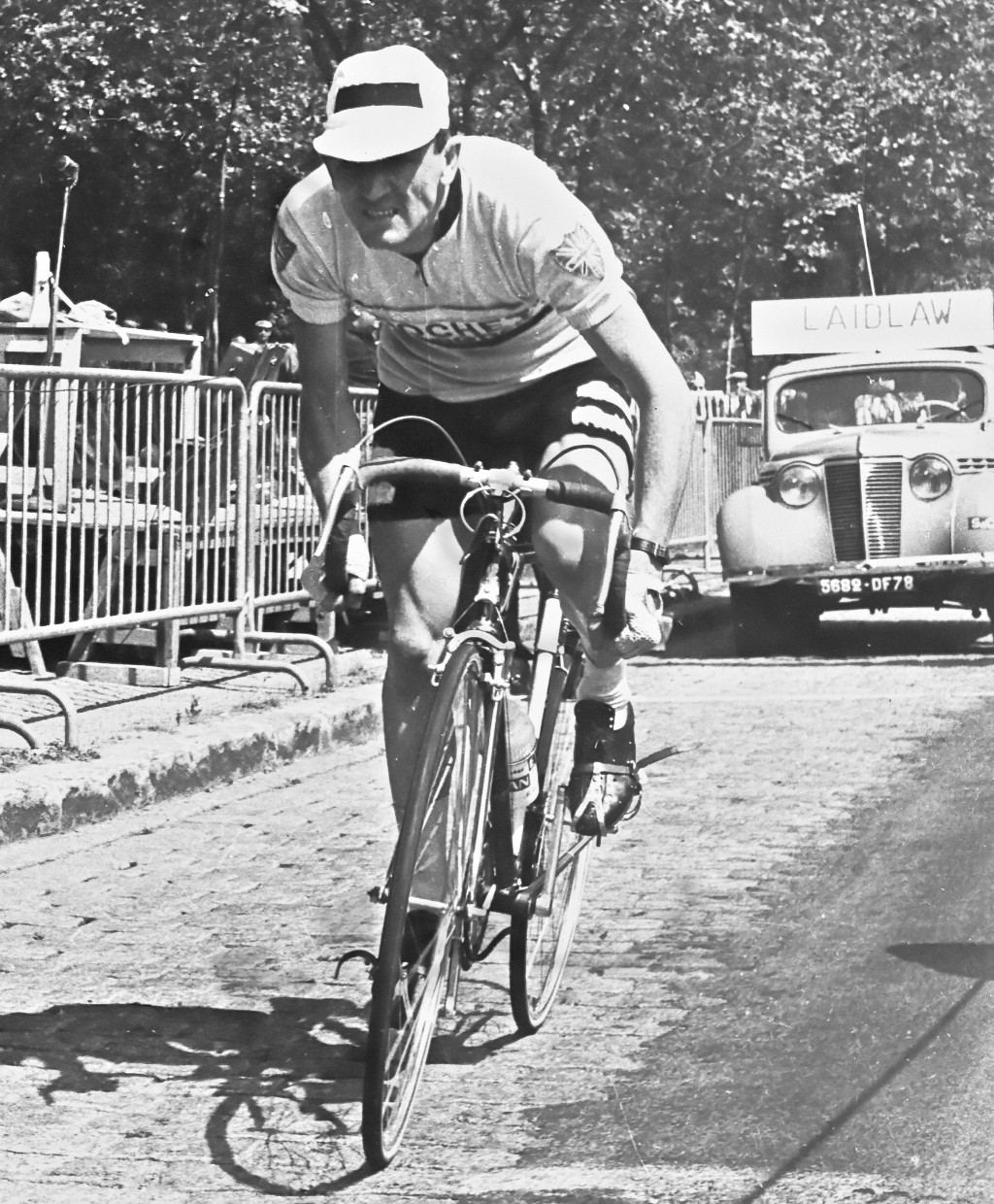
He turned professional in 1961 with Margnat Rochet Dunlop and became the first Scot to finish the Tour.
He had his time in the sun during the race, attacking on the monster climb of Superbagneres and netting himself the ‘most aggressive rider’ prize for the day.
He would end the race in 65th place overall, quitting the sport the next year, disillusioned with the tough, Machiavellian world of professional cycling.
* * *
1977: Bill Nickson
Yes, we know, he came from Liverpool and couldn’t pronounce, ‘Kincardine’ but spent several years living and racing in Scotland in the colours of Dunedin CC and as such we’ve included him.
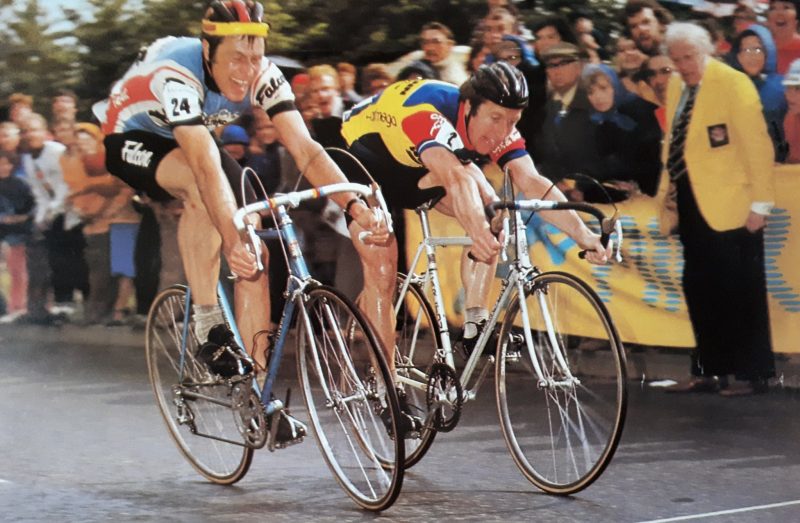
A prolific winner as an amateur, including the Manx International, Lincoln GP, British Amateur Championships, Girvan, Milk Race and prestigious GP della Liberazione he turned professional with Peter Post’s mighty Ti Raleigh formation for season 1977.
It was never going to be a marriage made in heaven; Post with his iron fist and Bill with his affable, laid back demeanour but he made the ’77 Tour team and was surviving.
But on a day of savage racing during the 17th stage to l’Alpe d’Huez he joined the gruppetto and ignored Barry Hoban’s warning that they were going to miss the time cut.
To jeers from his fellow ‘autobus’ passengers, Hoban headed off up the road, his former companions back in the gruppetto believed that because the group was so big – some 30 riders – that they wouldn’t be eliminated.
They were wrong and the race would end with just 53 finishers in Paris, Nickson not among them.
* * *
1983 – 93: Robert Millar
He participated 11 times, finishing eight times, winning three stages, a king of the mountains title and just missing the GC podium with fourth overall in 1984.
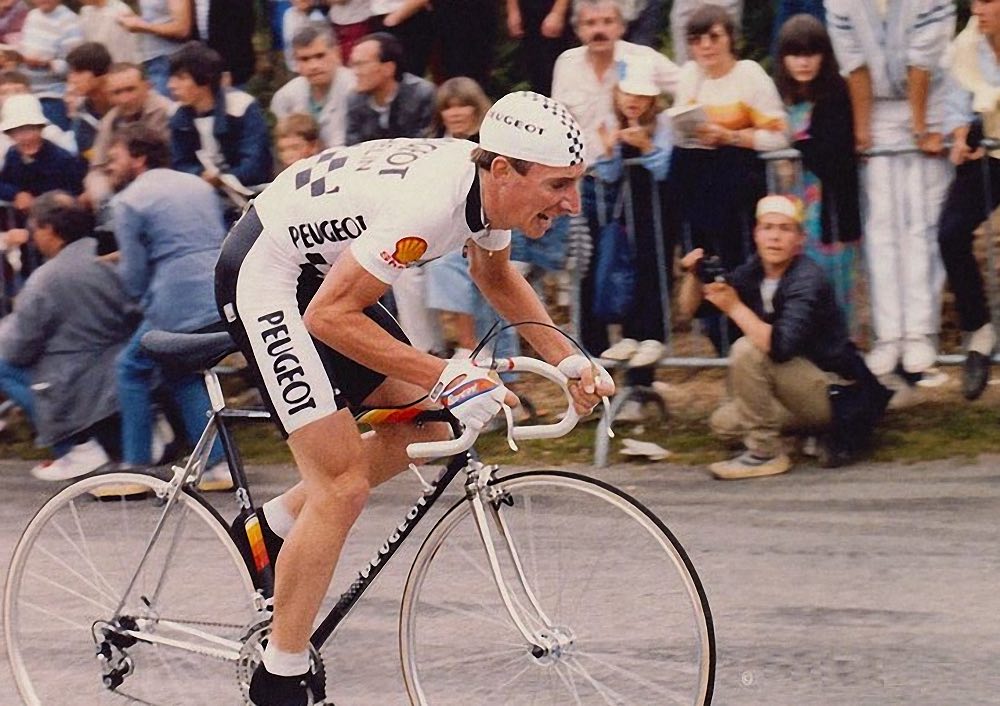
Millar turned pro with Peugeot for season 1980 after a stellar amateur career including two British Amateur Road Race Championship victories, a highly fruitful sojourn with the legendary Paris ACBB club and fourth place in the 1979 amateur Worlds.
His debut was highlighted with a brilliant 11th place in the 1980 Professional World Championships at Sallanches, regarded as one of the toughest ever and won by a rampant Hinault.
His progression was good, by 1982 he was second in the Tour de l’Avenir to Greg Lemond and he was in the Peugeot squad for the 1983 Tour de France.
His debut was stunning, 14th overall, third in the king of the mountains and a brilliant win on Stage 10, Pau to Bagneres-de-Luchon.
His progression continued in the ’84 Tour with fourth on GC, a stage win and the polka dot jersey of king of the mountains.
I believed that Scotland had a Tour de France winner in waiting.
But in ’85 his progression at le Tour halted as he slipped to 11th on GC and third in the king of the mountains; hardly surprising given he’d already ridden an excellent Vuelta – which was held in the spring in those days – where he was second overall but which had been stolen from him late in the day by Delgado with a deadly mix of bad luck, bad team management, Spanish combines and skulduggery.
For season ’86 he was with Peter Post’s Panasonic team, it saw him ride the Vuelta and again finish second – many would say that two Grand Tours was too much for such a slight rider and so it proved with illness forcing him out of the Tour late in the day on Stage 21 of 23.
Season 1987 saw him 19th on GC but this time with the Giro in his legs, in the ‘Pink Race’ he was second overall, king of the mountains and won a stage.
The ill-fated Fagor team was ‘home’ for ’88 and his Tour ended when injuries from a crash on Stage 17 forced him out on Stage 18 but not before he looked to have a stage win in the bag at Guzet-Neige when he was sent the wrong way in the closing metres with Italy’s Massimo Ghirotto stealing the stage.
The ’89 season saw him with Z Peugeot and no Vuelta or Giro participation prior to the Tour, where he bounced back to 10th on GC, fourth in the king of the mountains and won Stage 10 to Superbagneres.
A win in the 1990 Dauphine boded well for le Tour but there is a DNF posted against his name for that year; however he rode strongly in defence of Ronan Pensec’s maillot jaune on the climb to l’Alpe d’Huez before he left the race.
In ’91 he was with Dutch squad TVM and fourth on GC in the Dauphine and fifth with a stage win the Tour de Suisse looked like good portents but the Tour saw his worst ever finish position – 72nd place.
The ’92 race saw him inside the top 20 with 18th spot but no real highlights.
His final Tour was the ’93 race which yielded fifth and seventh places on mountain stages and 24th place on GC.
* * *
2000 – 2013: David Millar
Millar started 12 tours and finished 11, winning four stages along the way and wearing every classification jersey at some stage in his career.
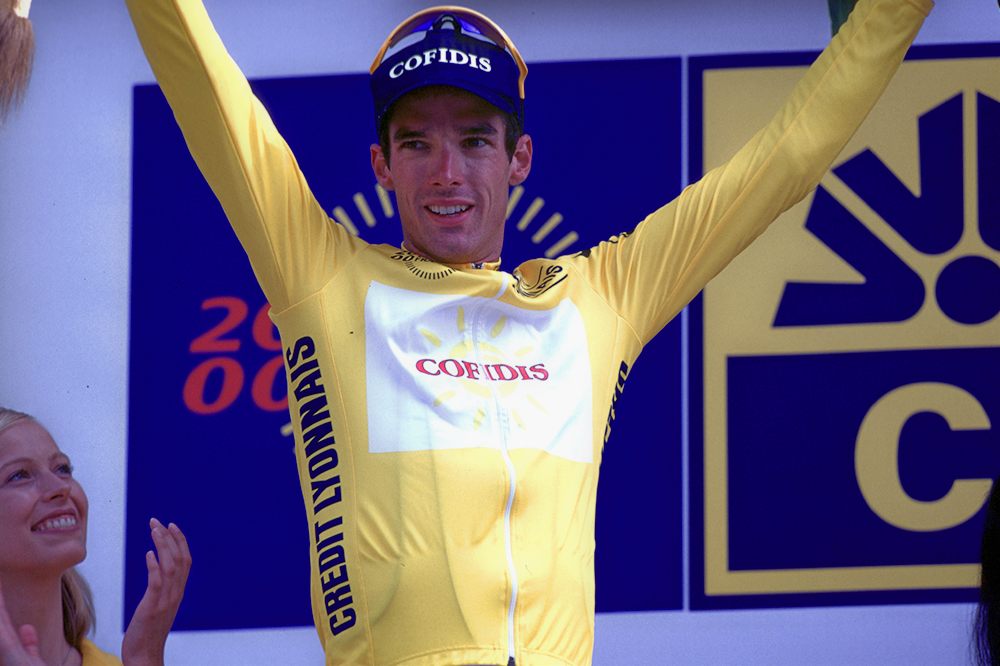
A talented junior – he won the RTTC Junior 25 mile title with a championship record 52:05 in 1995 – he moved to France and soon caught the eye of the pro teams, signing with Cofidis for the 1997 season.
His 2000 Tour debut for Cofidis was stunning, he won the opening 16.5 kilometre time trial, beating Lance Armstrong in the process and holding the yellow jersey for three days until ONCE depth charged the TTT; Millar finished the race in 62nd place.
Season 2001 has a DNF against his name on Stage 10 to l’Alpe d’Huez.
The following 2002 season he took a stage win at Beziers en route a final 68th place.
The Paris prologue in 2003 should have seen another maillot jaune but he dropped his chain – riding a single ring with no front changer or guide – late in the day to cede the win to Brad McGee by less than a second.
He finished the race gloriously though, winning the final TT ahead of Hamilton and Armstrong; his final GC placing was 55th that year.
His next participation was with Saunier Duval in 2006, having returned from his drugs suspension, unsurprisingly there were no highlights and he ‘got round’ in 58th place.
The 2007 race saw him in 69th place whilst 2008, by now with Garmin, saw him lose out narrowly to Kirchen in the Cholet TT – original winner Schumacher having been declassed for doping, there was a lot of it about back then – with a final finish in Paris of 66th.
He was 85th in 2009 and in 2010 158th.
The 2011 race yielded him a Garmin win in the TTT en route 76th place.
A year later in 2012 he was back to winning ways, taking Stage 10 ahead of JC Peraud.
His last Tour, where he finished in 113th place came in 2013.
* * *
2021: Tao Geoghegan Hart
Making his Tour debut and despite being ‘Hackney born and raised’ the 2020 Giro winner is of ‘Irish and Scottish’ ancestry – it says here…
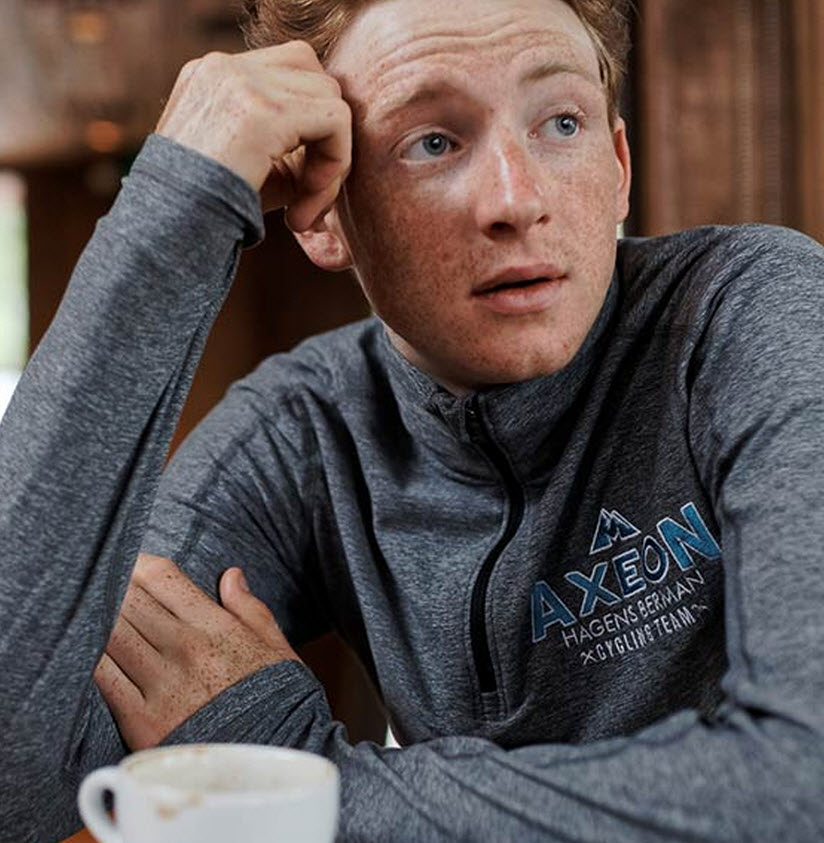
And the next of the Scottish riders will be…?



